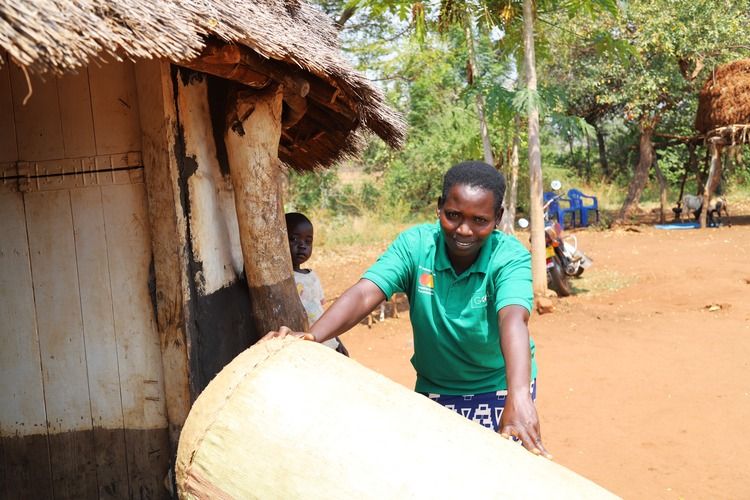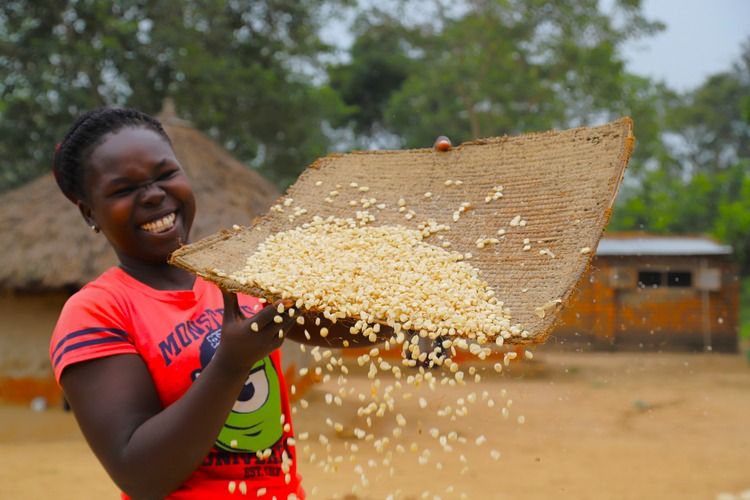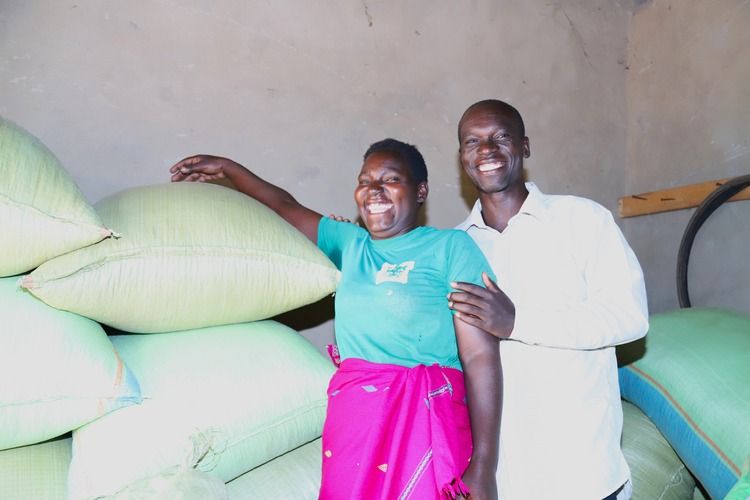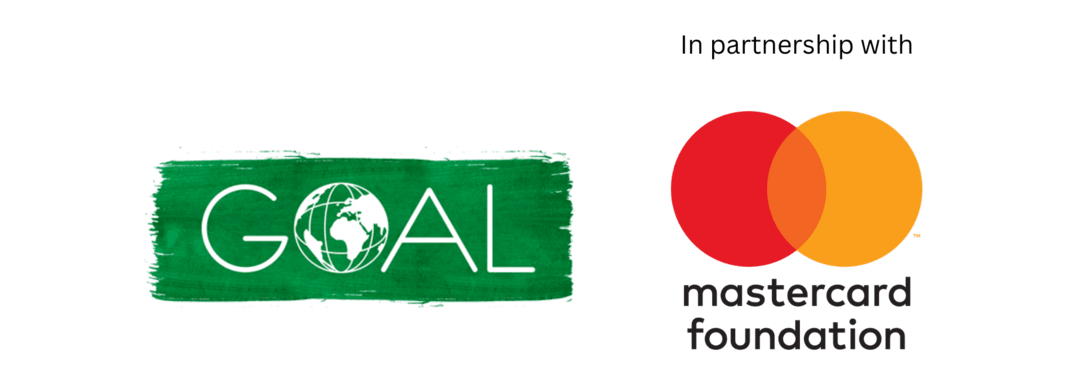 Stories
Stories
May 24, 2024 • 5 min read
GOAL is partnering with the Mastercard Foundation to help 300,000 young Ugandans, including 70,000 women, access dignified and fulfilling work in the agricultural sector.
Cathy’s Story
Cathy is a member of Balutute Youth Group in Te-Odongo Village in Kigum District, Uganda. Cathy recalls when MUCOBADI, one of GOAL’s local implementation partners for the Markets for Youth Programme, first approached her group. “They offered me and my group members very useful training, and encouraged us to produce for the market, something I hadn’t thought of doing before.”
However, Cathy hesitated to avail of the opportunity because she was unsure if her husband would support her. Thankfully, Cathy’s husband was delighted with the idea and supported her in growing ground nuts on 3 hectares of land. Cathy borrowed 150,000 Ugandan shillings (approximately 36 euros) from her VSLA to open additional gardens. This allowed her to employ fellow youth for cleaning and digging. Together, they harvested 12 bags of ground nuts.

Cathy’s husband is proud of his wife’s success and says she is a role model for women in the community. His positive and supportive attitude towards empowering women in the community has made him a role model for other men in Te-Odongo as well. Cathy plans on expanding her farm by planting watermelon seeds that she purchased from Nile-Agro Forestry.
The first time Cathy grew them, her harvest was sparse and didn’t earn her much money – but she isn’t ready to give up yet. “Next season, after understanding how to grow and manage it, I will make money,” she says confidently.

Elizabeth’s Story
Elizabeth is 28 years old and lives in Abongowat Village in Dokolo District, Northern Uganda. “I was a secondary school teacher, but now I am a proud farmer after receiving training under the Markets for Youth programme,” she explains. Elizabeth was connected to the programme by GOAL’s local partner, Wezesha Impact.
She received training in business development, marketing, and financial literacy before being introduced to GudieLeisure. The company provided her with further training on poultry keeping and the making of liquid soap, smearing oil, hand sanitiser, and organic manure. “The training I received from Wezesha Impact empowered me a lot. I got the courage to apply for a loan from BRAC (a Ugandan bank).”

Elizabeth received a loan of 1.5 million Ugandan shillings (approximately €361), which she used to finance a small shop and poultry project. She recently purchased 400 chicks for 1.2 million Ugandan shillings (approximately €289) and will sell them for more than four million Ugandan shillings (approximately €964) in five weeks.
Her village is not connected to the national power grid, so she recently invested in purchasing solar panels to provide her chicks with warmth and light.
Elizabeth’s business allows her to earn a monthly income, which she didn’t always receive when she worked as a teacher. She now trains her fellow youth on good business practices and hopes to be a leading businesswoman in Dokolo and beyond.
Her advice to youth is: “Don’t sit down and wait. Start something, even if it is small. Do not fear the risk of starting. Just start, and bigger things will follow.”

Ambrose and Lydia’s Story
Ambrose and his wife, Lydia, live in Ali Village, Dokolo Village, Northern Uganda. “Before, I was growing mainly maize and just a few other crops for home consumption. I also earned some money from casual labour to support my family. Honestly, I didn’t like farming that much,” Ambrose admits. “We faced challenges like crop diseases and bad weather. To do farming as a business was really tough. There was no money to invest, it was hard to find a market for our produce, and my knowledge about good farm practices was limited.”
Markets for Youth introduced Ambrose to to 49ers, a seed company focused on strengthening supply chains, through a local VSLA. Group members received training in financial literacy and agronomic practices. These trainings ignited his passion for farming, and Ambrose now generates a healthy income from farming and earns a commission from selling 49ers’ seeds to fellow farmers.
Ambrose is an inspiration to his community and has trained four youth groups in his county on commercial agriculture. Lydia, a member of Note En Teko (Together We Are Strong) youth group, said: “We didn’t take the VSLA seriously. We only had a few members and saved a little. But after the training and the new opportunities, there has been a great mindset change. Almost all youth, husbands and wives, are involved and plan together.
“I am a mother of two children and believe I have a significant role to play in the well-being of our family and the success of our projects. My husband always plans with me, and I am informed of all project updates and plans.”
“I am so happy,” Ambrose says, smiling. “One member of Note En Teko recently bought 30 kilograms of seeds and harvested 500 kilograms of rice, making some good money.” His next goal is to acquire a solar pump, which will enable farmers to continue growing vegetables into the dry season, and diversify his business by opening up a cereal store and investing in livestock farming.

About Markets for Youth
Uganda has one of the youngest populations in the world. More than 75% of the population is below the age of 30. The country has one of the highest youth unemployment rates in Sub-Saharan Africa at 13.3%. With employment opportunities limited, finding work and a pathway out of poverty is a huge challenge. Young Africa Works in Uganda is focused on finding solutions to the youth employment challenge using a market system approach.
GOAL is partnering with the Mastercard Foundation to help 300,000 young Ugandans access dignified and fulfilling employment in the agricultural sector. The programme is also empowering 70,000 women, 30,000 refugees, and 15,000 people living with disabilities to start sustainable, resilient agri-businesses.
Private sector partnerships and civil society are playing a huge role in the implementation of the programme. The cornerstone of the initiative is adaptive management with an emphasis on evidence-based learning, open communication and optimising the use of technology. Learn more about the Markets for Youth programme.

